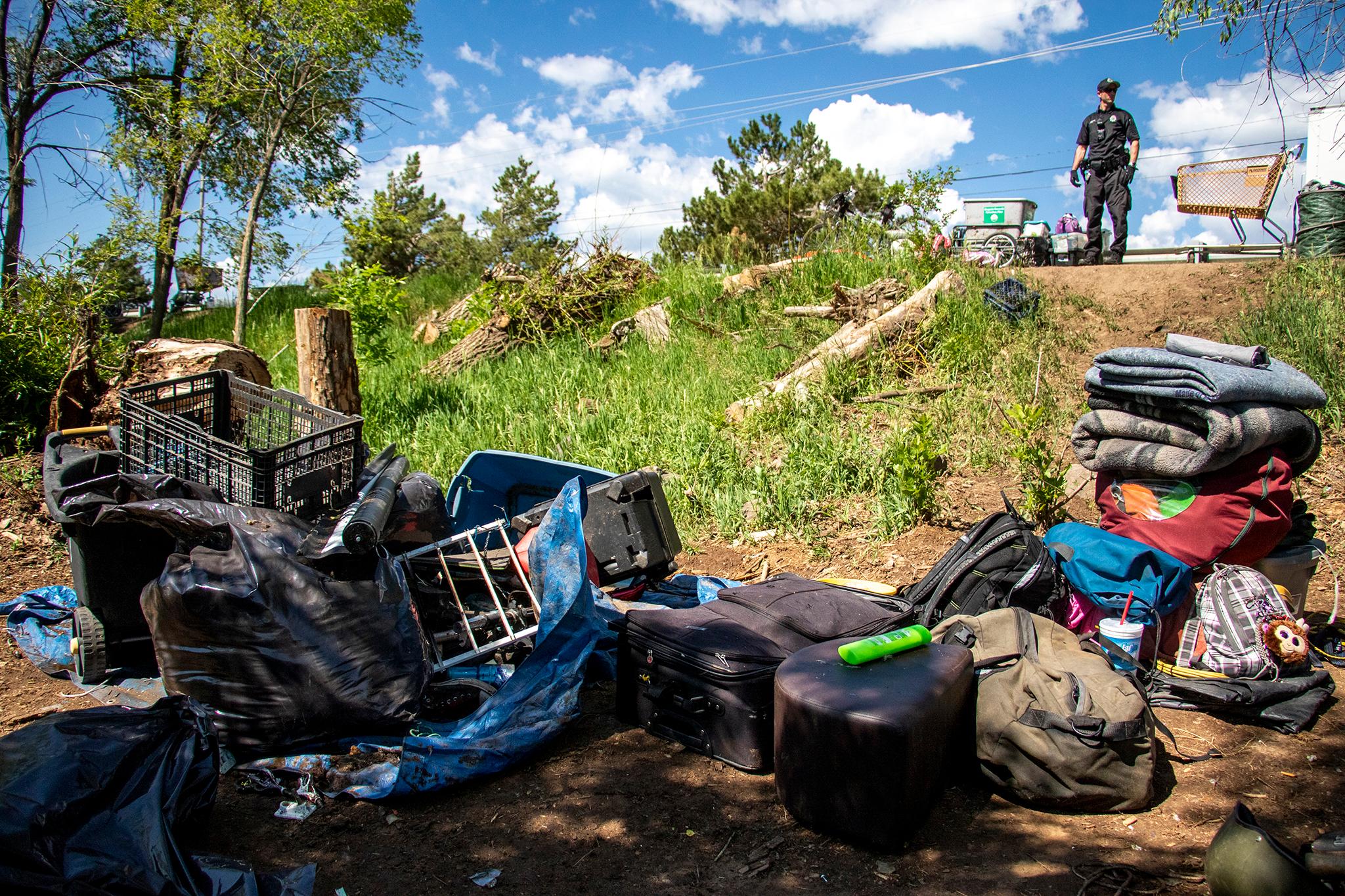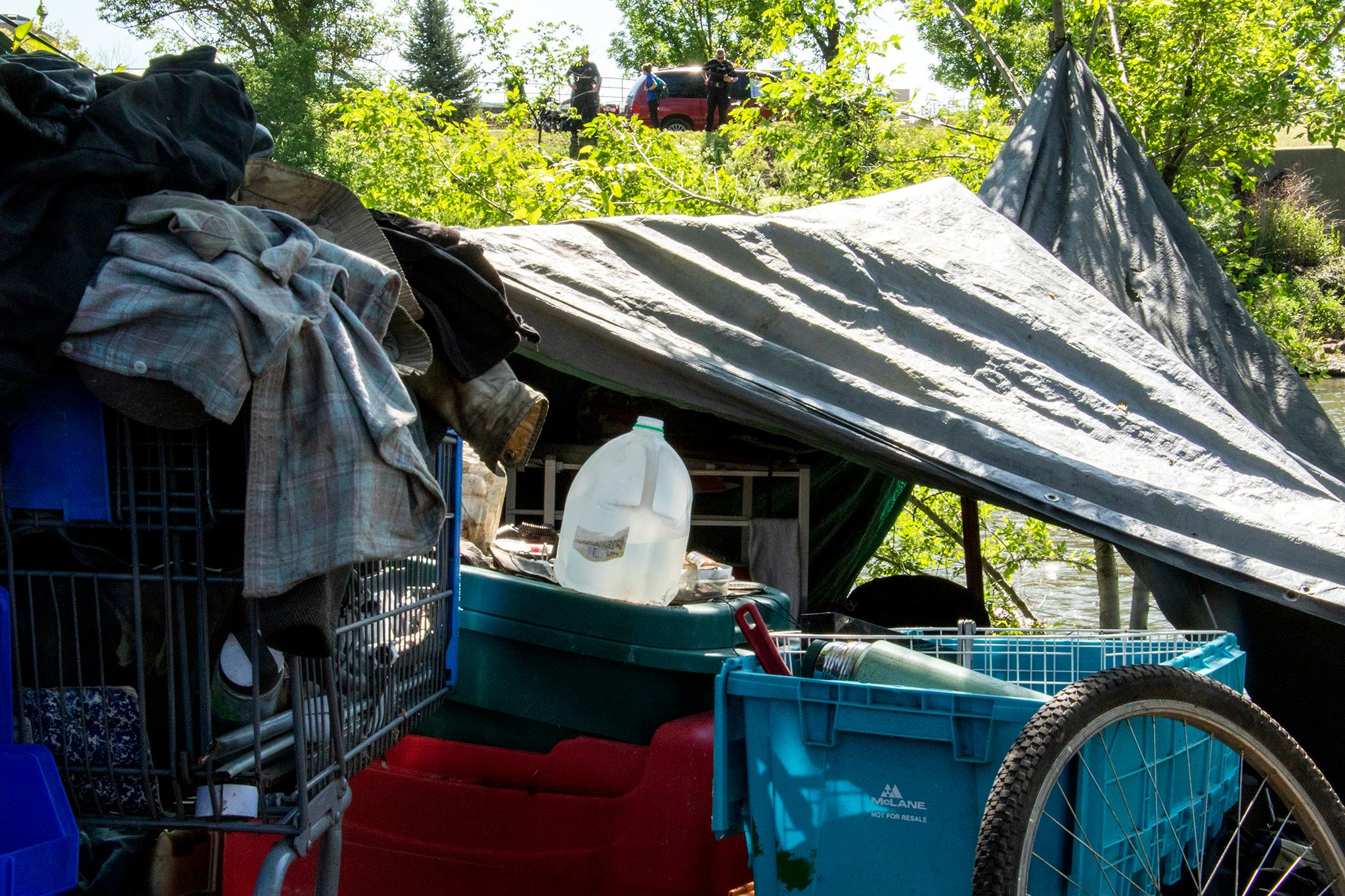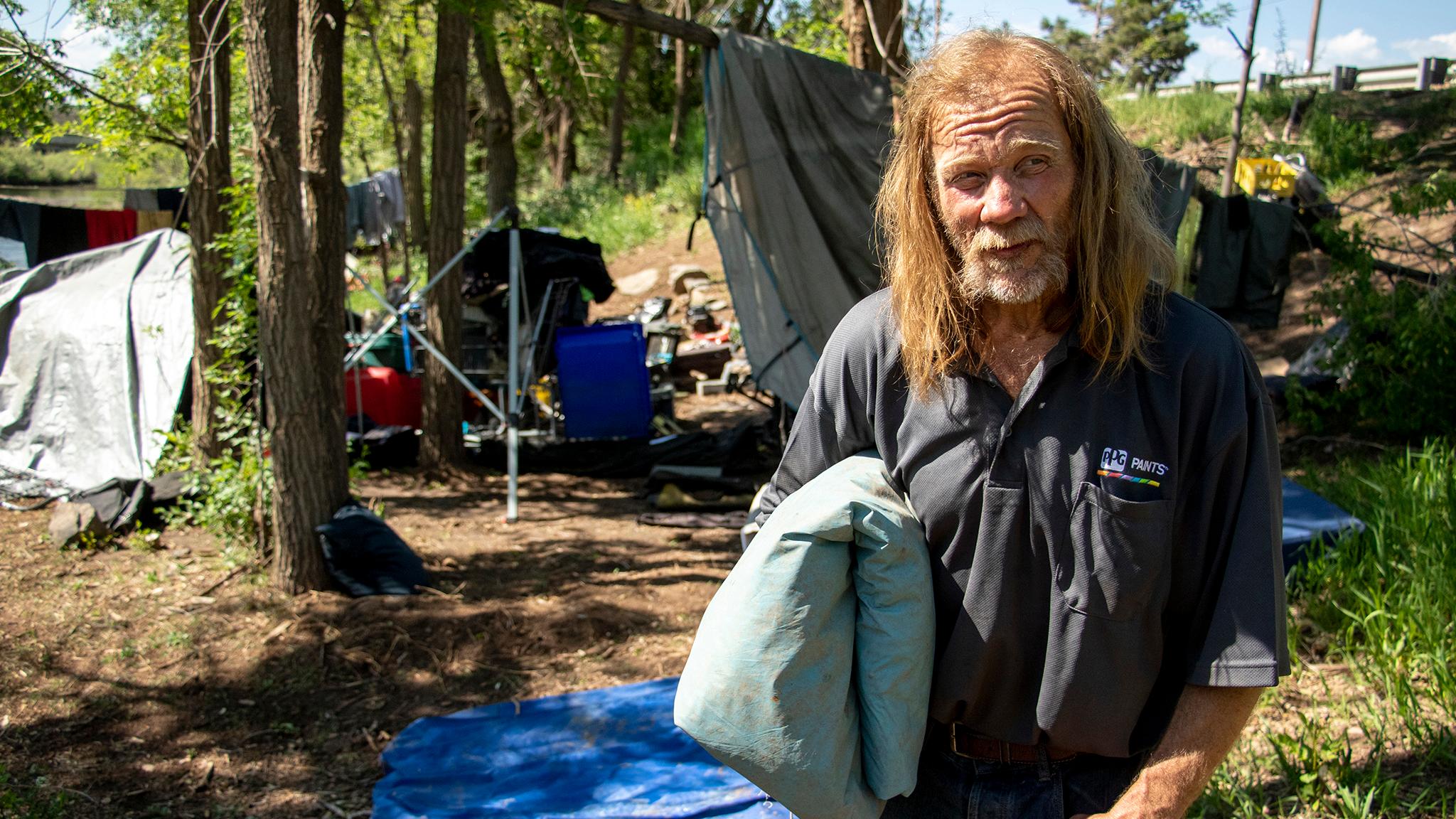Blankets, bicycles, backpacks and other household goods of the unhoused piled up along a six-block stretch of South Platte River Drive Tuesday.
Police in the Denver suburb of Englewood were leading a sweep of riverside encampments near where West Dartmouth Avenue crosses the Platte. The operation addressed immediate concerns about sanitation and safety. There were no claims it was a solution to the underlying problem of homelessness -- not from police, service providers, the people being moved along, the area's permanent residents, nor nearby business owners with signs on their front doors noting their bathrooms were not public. Englewood has overnight shelters available only when the weather is severe.
Nate Navarro, a 17-year-old who said he'd grown up in a mobile home park tucked behind light manufacturing businesses across the street from the river, said encampments had been cleared before only to reappear.
"It's probably going to happen again," Navarro said. "If it's not there, where are they going to live?"
It's a question for the region, said Matt Meyer, executive director of the Metro Denver Homeless Initiative. He said such sweeps will only move people to other towns and cities that need to work together to "create more housing options and solutions for folks."
"We simply don't have enough affordable housing in the region," Meyer said.

Denver police accompanied their Englewood colleagues Tuesday. Englewood Police spokesman Sgt. Chad Read said Denver police had more experience in such operations.
Cyclists sped by on nearby recreational trails -- at one point a man in Lycra gently asked to pass a man wheeling his belongings away on cart attached to a bike without a seat. Mental health and outreach workers accompanied police officers as they fanned out along the river asking people to leave and offering to connect them to services. Police stored belongings left behind in pods that were marked with location information so that they could be reclaimed later at the nearby Englewood Service Center, where the city's automobile fleet is maintained, next door to a wastewater treatment plant.
The operation was orderly. Read reported one arrest. Police acted on a warrant issued for a man who had failed to appear in court to answer a trespassing charge, a typical infraction for someone experiencing homelessness.


Read acknowledged many people being moved away Tuesday would likely go on to camp in other cities.
"A lot of these folks don't want to go to the shelters," he said. "At the same time, we can offer them resources if they need help and they want help. That's why we have these clinicians going with the teams."
Tuesday morning, Bobby Deden walked back to his small camp just over the city line in Denver. He said he had moved his sleeping bag and other belongings two days ago from Englewood 1,000 feet down the Platte to Denver. He was carrying a plastic bag of drinks he'd bought at a nearby gas station, where he said he'd run into a driver for a tree cutting company and asked about getting a job. The driver gave him his boss's phone number, which Deden had jotted down on a scrap of paper.
"Some of us have gotten used to this kind of life. Some of us are trying not to get used to it," Deden said.
Deden grew up in nearby Sheridan and said he had been homeless about two months following a series of setbacks -- losing his job in construction, breaking up with his girlfriend and coming down with a skin infection that briefly sent him to the hospital. He said the disruption of the sweep had interrupted his search for a job. Outreach workers in recent days had offered help getting clothing, he said.
"If they could help us get on our feet, that would be such a great help," Deden said.
Englewood officials had announced May 20 that the camps would be cleared Tuesday. The city cited, among other issues, a fight earlier in May between two men experiencing homelessness that ended in a stabbing at one of the dozens of small camps. Police officers also have reported finding trip wires, hypodermic needles and human waste and expressed concern camp dwellers could be in danger if the river floods. Severe rains are expected Wednesday.
"The growing encampment is creating serious issues with public health and safety. For the welfare of the public and of the individuals residing at the camp, it's simply become a dangerous situation that can't be ignored," Englewood Police Chief John Collins said in a May 20 statement.
Since then, police and outreach workers have been informing camp residents they would have to move. Read said Tuesday that at the time the sweep was announced, up to 50 camps were scattered along the river, none with more than two people.

Boo Crosby, who is a member of a network of people in Englewood who support their neighbors on the streets, said about half the camps were gone on Tuesday. Crosby also manages Cafe 180, a nonprofit restaurant on South Broadway that offers meals for as little as $4 or in exchange for an hour of work. Crosby said he has learned at Cafe 180 how hard many people living in homelessness work.
Crosby said the sweep was necessary for the safety of camp residents and to maintain the river and its banks. He accompanied police Tuesday, telling campers about the Change the Trend network and its mentoring program that connects people to mental health and other resources.
Crosby acknowledged he could not offer housing. He said Englewood Housing Authority officials who also are involved with Change the Trend have told him of wait lists that are years long.
"It's pretty heartbreaking to hear," he said.
Donna Zimmerman, whose Giving Heart Englewood is also part of the Change the Trend network, said her faith-based organization working with others has been able to find housing for about 10 people over the last year. Giving Heart Englewood is open two days a week, offering a place to pick up mail, hygiene items and clothing or meet with a counselor for help connecting to benefits. When the weather is good, Zimmerman said, 30 or 40 people drop in on a typical day. When it's poor, up to 60 come.
Zimmerman said those serving the homeless need more community support.
"We also need housing," she said.
Police Sgt. Read said the sweep that began Tuesday would continue throughout the week to give some people more time to move on. Later, reseeding and other work to fix damage along the river bank will be undertaken.













